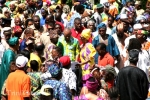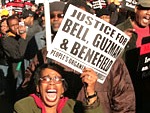By Linda E. Edwards
Dated: December 26, 2006
Your Excellency
The President of the Federal Republic of Nigeria
Sir:
 I e-mailed a Nigerian friend the article from the New York Times this morning, with a brief comment, “O God, Again?”
I e-mailed a Nigerian friend the article from the New York Times this morning, with a brief comment, “O God, Again?”
Again, because I am tired of seeing articles about a ruptured pipeline, with people stealing gasoline, which explodes and kills them. Another few hundred are dead, in Africa’s most populous country. Maybe that is less than the children who will die of AIDS related diseases today, scattered across the continent. Maybe that number, two hundred and sixty and still counting, may have starved to death by the time I am finished typing this letter, and so, maybe, that is a small number. None of the people to whom I sent the article, however, thought that two hundred and sixty city dwellers in Lagos were so dispensable that they behaved as if these people were not to be missed. The sounds of the mothers wailing because their children have died, the sounds of the girl looking for her brother, and getting only the ring tones of his phone, would not go out of my ears.
Continue reading An Open Letter To President Olusegun Obasanjo →
 Homeland Security: There’s a lot of talk about al-Qaida safe havens in Somalia, Afghanistan, Pakistan and Iraq. But the FBI is closely watching a potential hot spot in our own hemisphere.
Homeland Security: There’s a lot of talk about al-Qaida safe havens in Somalia, Afghanistan, Pakistan and Iraq. But the FBI is closely watching a potential hot spot in our own hemisphere.
 If I didn’t know better, during the month of February I will be left with the distinct impression that the Civil Rights struggle, crafts and music mixed with a dazzling display of dance and a variety of cultural activities represents the sum of Africa’s contribution to civilization. In spite of the overwhelming scientific evidence and the existence of numerous artifacts, little is ever mentioned in the mainstream about Africa’s contributions to civilization in the fields of science and technology. With the exception of inquiring minds, the proliferation of numerous books and scholarly articles on the subject has done little to dispel the truncated view of Africa as simply a land of exoticism in the consciousness of the greater public.
If I didn’t know better, during the month of February I will be left with the distinct impression that the Civil Rights struggle, crafts and music mixed with a dazzling display of dance and a variety of cultural activities represents the sum of Africa’s contribution to civilization. In spite of the overwhelming scientific evidence and the existence of numerous artifacts, little is ever mentioned in the mainstream about Africa’s contributions to civilization in the fields of science and technology. With the exception of inquiring minds, the proliferation of numerous books and scholarly articles on the subject has done little to dispel the truncated view of Africa as simply a land of exoticism in the consciousness of the greater public. Is the plan announced recently by the George Bush Administration to dispatch an additional 21,500 American troops to Iraq really an excuse for a United States military build up on the Iraq-Iran border and a prelude to a US invasion of Iran?
Is the plan announced recently by the George Bush Administration to dispatch an additional 21,500 American troops to Iraq really an excuse for a United States military build up on the Iraq-Iran border and a prelude to a US invasion of Iran?
 Indian prime minister Manmohan Singh became the first leader of his country yesterday to compare the condition of low-caste Hindus with that of black South Africans under apartheid.
Indian prime minister Manmohan Singh became the first leader of his country yesterday to compare the condition of low-caste Hindus with that of black South Africans under apartheid. The Times reported on Sunday, that there was a massive protest down Fifth Avenue in New York, to protest the killing of Sean Bell, the young man murdered on the morning of his wedding, by a gang of New York’s Finest, the city police. A total of fifty shots were fired by the police at a car with three unarmed young African Americans in it, one being the groom-to-be on his way home from his Bachelor Party. He died on the spot. According to The Times, the protest, a silent one, was organized in the heart of the shopping district to bring maximum attention to this grave situation. It was organized to say that human lives, even the lives of African American young men in New York, who seem on their way to becoming an endangered species, had value, and people should be concerned about this.
The Times reported on Sunday, that there was a massive protest down Fifth Avenue in New York, to protest the killing of Sean Bell, the young man murdered on the morning of his wedding, by a gang of New York’s Finest, the city police. A total of fifty shots were fired by the police at a car with three unarmed young African Americans in it, one being the groom-to-be on his way home from his Bachelor Party. He died on the spot. According to The Times, the protest, a silent one, was organized in the heart of the shopping district to bring maximum attention to this grave situation. It was organized to say that human lives, even the lives of African American young men in New York, who seem on their way to becoming an endangered species, had value, and people should be concerned about this. British Prime Minister, Tony Blair, can best demonstrate that he is serious with respect to his recent statement on slavery by having legislation drafted and introduced in the United Kingdom Parliament for the provision of reparations to former British colonies in Africa and the Caribbean, which were victims of slavery, the slave trade and/or de-industrialisation.
British Prime Minister, Tony Blair, can best demonstrate that he is serious with respect to his recent statement on slavery by having legislation drafted and introduced in the United Kingdom Parliament for the provision of reparations to former British colonies in Africa and the Caribbean, which were victims of slavery, the slave trade and/or de-industrialisation. The United Nations General Assembly has adopted a Jamaican-inspired resolution to commemorate the 200th anniversary of the trans-Atlantic slave trade.
The United Nations General Assembly has adopted a Jamaican-inspired resolution to commemorate the 200th anniversary of the trans-Atlantic slave trade.  Today, the people of Venezuela go to the polls to elect a president. The election is of significance to Trinidad and Tobago because Venezuela happens to be the country closest to us. More than mere geopolitics, under President Hugo Chavez, that country has taken a leading role in hemispheric affairs as well as being a more-than-minor player in global politics. As the fifth biggest oil producing country in the world, Venezuela is also strategically poised to influence the Caribbean, as it did with the Petrocaribe initiative and several bilateral trade and aid agreements with member states of Caricom.
Today, the people of Venezuela go to the polls to elect a president. The election is of significance to Trinidad and Tobago because Venezuela happens to be the country closest to us. More than mere geopolitics, under President Hugo Chavez, that country has taken a leading role in hemispheric affairs as well as being a more-than-minor player in global politics. As the fifth biggest oil producing country in the world, Venezuela is also strategically poised to influence the Caribbean, as it did with the Petrocaribe initiative and several bilateral trade and aid agreements with member states of Caricom.